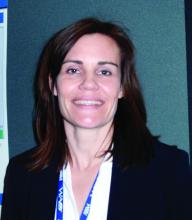ORLANDO – and resulted in almost every patient having their allergy label removed, researchers reported.
In what the researchers said was the first study showing the utility of telemedicine in evaluating patient-reported penicillin allergies, allergy and immunology physicians did a secure telemedicine consultation with patients after they underwent penicillin skin testing with a physician assistant; an approach which, on average, took 123 minutes fewer each time than if the physician had done the consultation face-to-face. The teleconference can be done on a laptop or smartphone.
Of 50 patients prospectively assessed with this approach over a 4-month period last year, 46 (92%) were delabeled, with $23,000 in direct antibiotic cost savings, or $360 per patient, said Allison Ramsey, MD, an allergist at Rochester Regional Health and at the University of Rochester (N.Y). presenting at the joint congress of the American Academy of Allergy, Asthma and Immunology and the World Asthma Organization.She said the approach is sensible and effective, and it is a good alternative to the traditional way of doing these tests. “What this takes out of that is the travel part. Someone else is doing the travel and the technique of testing,” added that people often are labeled in childhood after getting a rash that was thought to be related to penicillin, but actually was just a coincidence that was unrelated. Then the false allergy label is attached to them for life.


